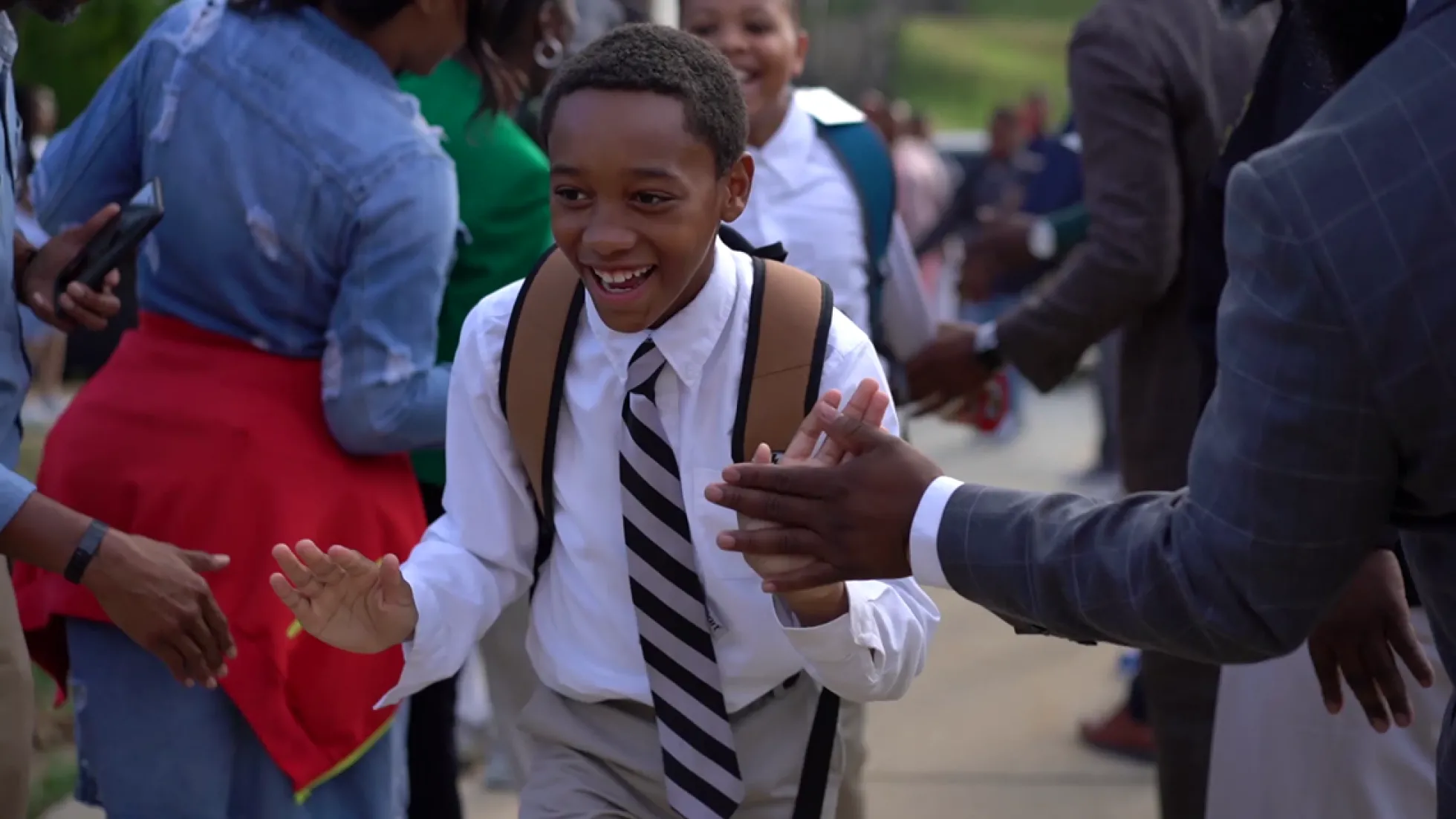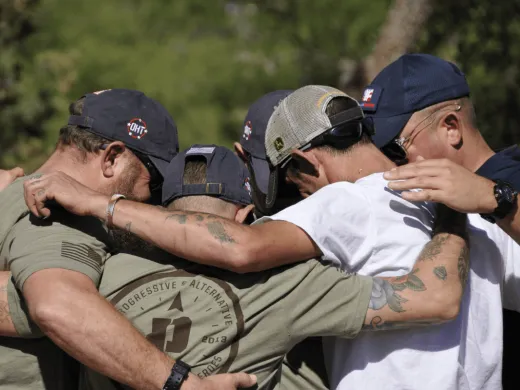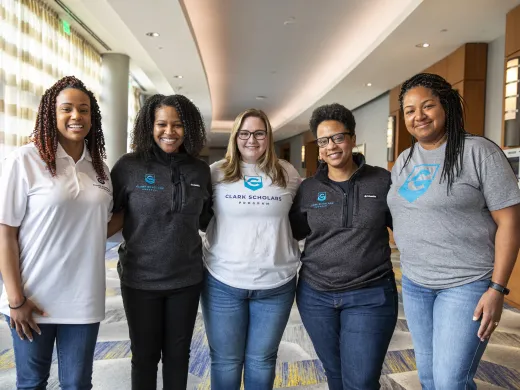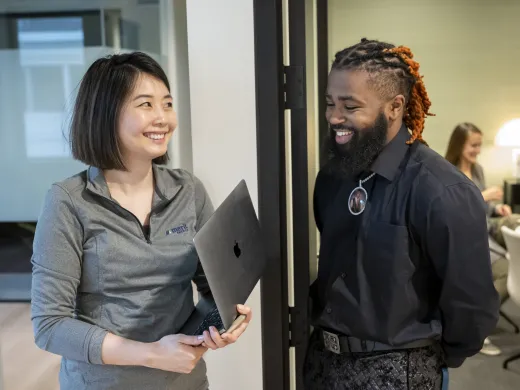Grantee Case Study
Strong Relationships and Role Models Help Black and Latino Boys Succeed
with Statesmen College Preparatory Academy for Boys
As part of its longstanding emphasis on investing in education in Washington, DC, the A. James & Alice B. Clark Foundation sought to partner with innovative schools that took creative new approaches to student success. They found one in educator Shawn Hardnett, the founder and CEO of Statesmen College Preparatory Academy for Boys Public Charter School, who was focused on creating a school full of caring adults for his students and expanding student horizons. The Clark Foundation was one of the school’s first funders, supporting a compelling new school model that equips students with the social, emotional, and academic skills necessary to thrive in and out of the classroom.

Launching an Innovative School Model in DC | Clark Foundation
A New Model to Improve Outcomes for Black and Latino Boys in DC
Hardnett understands the untapped potential of and challenges faced by Black and Latino boys. Of 29 boys that grew up with him in Rochester, NY, only five graduated from high school and only Hardnett finished college.
If it hadn’t been for Hardnett’s favorite biology teacher in high school who insisted he attend college and become a teacher, Hardnett said that he likely would not be an educational leader at the vanguard of cultivating well-being, confidence and aspiration in Black and Latino male middle school students. This experience remains a powerful reminder to Hardnett of the crucial role that supportive adults play in the lives of students.
By 2017, Hardnett had been working for several years in DC to improve educational outcomes for Black and Latino boys, many of whom came from backgrounds with trauma. That trauma often manifests itself in what many educators view as behavior challenges requiring discipline and may lead to suspension.
But as Hardnett notes, these students cannot actively participate in their education if they miss three to five days of school multiple times a year. In addition, many Black and Latino boys are several years behind grade level academically, which can lead schools to incorrectly place them in Special Education classes. Hardnett said that no number of educator trainings he conducted or new approaches in schools seemed to make a difference in improving outcomes.
So Hardnett and his team set out to redesign the student experience for Black and Latino boys with a new public charter school. But before establishing the school’s mission and focus, the founders wanted to hear and gain insights from their target student group and from men who had grown up in similar circumstances, attended college and now had successful careers.
Hardnett and his co-founders interviewed 450 Black and Latino boys and 150 Black and Latino men. From their answers, Hardnett knew that student-teacher relationships, positive adult role models, and an emphasis on mental and emotional wellness was critical. “Black and Latino boys are the population that is furthest from opportunity. And as you are furthest from opportunity, you are furthest from support. The resulting behaviors often manifest as violence. And so we decided two things. One, we were going to do this for Black and brown boys. Two, we were going to do it with Black and brown men who look like them and are from their communities. And so 65% of my staff is Black men.” Hardnett said.
Investing in an Innovative New School Model in DC
The Clark Foundation prioritized supporting students in the Washington, DC area, the place Mr. Clark considered his home and found much of his success. He understood the importance of investing in the next generation and was committed to creating opportunities for students to reach their full potential.
As a longtime funder of education in DC, the Foundation also recognized the difficulty of moving the needle on student outcomes through traditional school models. Though Statesmen’s model was new and unproven, the Foundation believed that Hardnett’s unique approach could enable Black and Latino boys living in under-resourced communities to thrive socially, fulfill their academic potential and imagine a future for themselves grounded in stable careers and communities.
Another focus of the Foundation was to partner with visionary leaders who have a deep understanding of the challenges that DC students face. With the combination of strong leadership and his innovative model, Hardnett’s team was an ideal partner for the Clark Foundation. “We had gotten to know these leaders. They had spent time listening to school aged boys about their educational experiences and were thoughtful in designing this school. They adapted along the way and we trusted this team to build a school that serves Black and brown middle schoolers in DC really well. Statesmen exemplifies how a school can educate and support young people in DC and beyond,” said Danielle Hamberger, Director of DC Education Initiatives.
The Foundation was also interested in showing other funders and educators how philanthropy can effectively support new school models, like Statesmen’s single-sex, public charter school focused on improving outcomes for middle school Black and Latino boys. “We believe in this team and the Statesmen scholars. These students can achieve academic and personal success and deserve a school culture and community that is designed to foster this for them,” Hamberger said.
We need to see ourselves in the teachers. We need to see ourselves on the walls. We need to see ourselves in the curriculum and materials.
Shawn Hardnett
Founder and CEO, Statesmen College Preparatory Academy for Boys
Holistic Well-Being Fosters Academic Success
The Clark Foundation invested an initial $817,000 in Statesmen Academy to support Hardnett’s request for mental health services, a director of student life and instructional support for teachers.
Knowing first-hand the challenges his potential students faced, the transformative influence that involved adults could make in their lives and the lack of funding to provide adequate counseling, Hardnett decided to initially focus on the mental and emotional well-being of their teachers.
“A well-regulated adult in front of every child results in well-regulated students and an environment that regulates, where the boys see emotionally healthy and stable men who look like them,” Hardnett said. Statesmen provided one-on-one therapeutic support sessions and group counseling to their staff. Focusing on the mental and emotional well-being of teachers multiplies the effect of high-quality therapy in the classroom, and equips them to deal with manifestations of trauma, such as behavioral outbursts, inspire their students and begin the process of healing.
Rather than utilizing traditional disciplinary measures, which Hardnett views as counter-productive, Statesmen approaches most behavior requiring intervention as a result of an unmet physical, psychological, emotional or social need. Hardnett said that many of his students come to school not realizing they are acting out their trauma, but that their anger and the lack of support they feel are their everyday normal. Instead of detention or suspension, Statesmen relies on counselors to work with each student on addressing their specific needs and establishing behavioral goals, as well as a social worker who connects families with community-based organizations to ensure their basic needs are being met.
Hardnett believed that a key to making the students emotionally secure enough to absorb the school’s positive messages was to give them a glimpse of who they could become. “We need to see ourselves in the teachers. We need to see ourselves on the walls. We need to see ourselves in the curriculum and materials. We need to see ourselves in the books. We need to be affirmed through what you are providing for us,” Hardnett said of his students. Relationships between adults and students, and among students, are a linchpin of the school, which has as its mission that each boy is “known and loved.”
Hardnett was also determined to expand the horizons and aspirations of his students. In 2022-23, the seventh and eighth graders went to Spain, France and England. Hardnett said the trip changed their lives, showed them there is a world beyond Washington, DC and prevented “identity foreclosure.” The students practiced “traveling well” by short trips to colleges and cities near DC. These experiences influenced their behavior when visiting private high schools, which are eager to meet more prospective students from Statesmen.
Academic Growth, Healthy Behaviors
Statesmen’s results speak for themselves. In 2023, 53 eighth graders became Statesmen’s first graduating class. Graduates have enrolled in public and independent high schools in DC with strong student supports, including School Without Walls, Thurgood Marshall Public Charter School and Benjamin Banneker High School
Hardnett watched his students excel in their academics within the school’s holistic approach. The attendance rate is at an impressive 91% and standardized test scores are steadily growing, and in many cases at a more rapid pace than their peers. Notably, the standardized test scores for students deemed “at-risk” and having been classified needing Special Education – traditionally low-scoring groups – increased more than other students.
Alongside their schoolwork, the boys at Statesmen also have excelled behaviorally and emotionally, an integral piece of the puzzle for their current and future success. Behavior and disciplinary incidents improved, including shorter length of crisis incidents – an outburst that once might have continued for two hours may be over in 10 minutes, Hardnett says.
In 2021, the Clark Foundation contributed a four-year, $1 million grant to Statesmen for general operating expenses and to support the school in meeting its full potential. Hamberger said by then that Hardnett was well on his way to his goal of transforming not just the school experience for Black and Latino boys but the trajectory of their lives.
“At Statesmen, I see middle school students showing up to learn, engage, achieve, and support their fellow scholars. I see caring educators who want to be a part of their educational success. I feel joy and pride in the building, and I see a lot of hard work happening. Schools strive for this type of culture,” Hamberger said.
With Hardnett’s hope that Statesmen graduates will return to their communities to be agents for change, the Clark Foundation believed that this new kind of charter school model could have a positive ripple effect across DC. Hardnett said his team is examining how to successfully replicate the Statesmen model and codify those elements for those interested in tapping them. Hardnett also hopes that he can turn over his job someday to one of his students: “We are eager to get to the point where one of the boys who attended the school works for the school, eventually leads the school and works with a group of alumni to reshape the community with a plan of their own.”
Additional Case Studies
View All
A Unique Vision to Transform Mental Health Approaches for Veterans and First Responders

